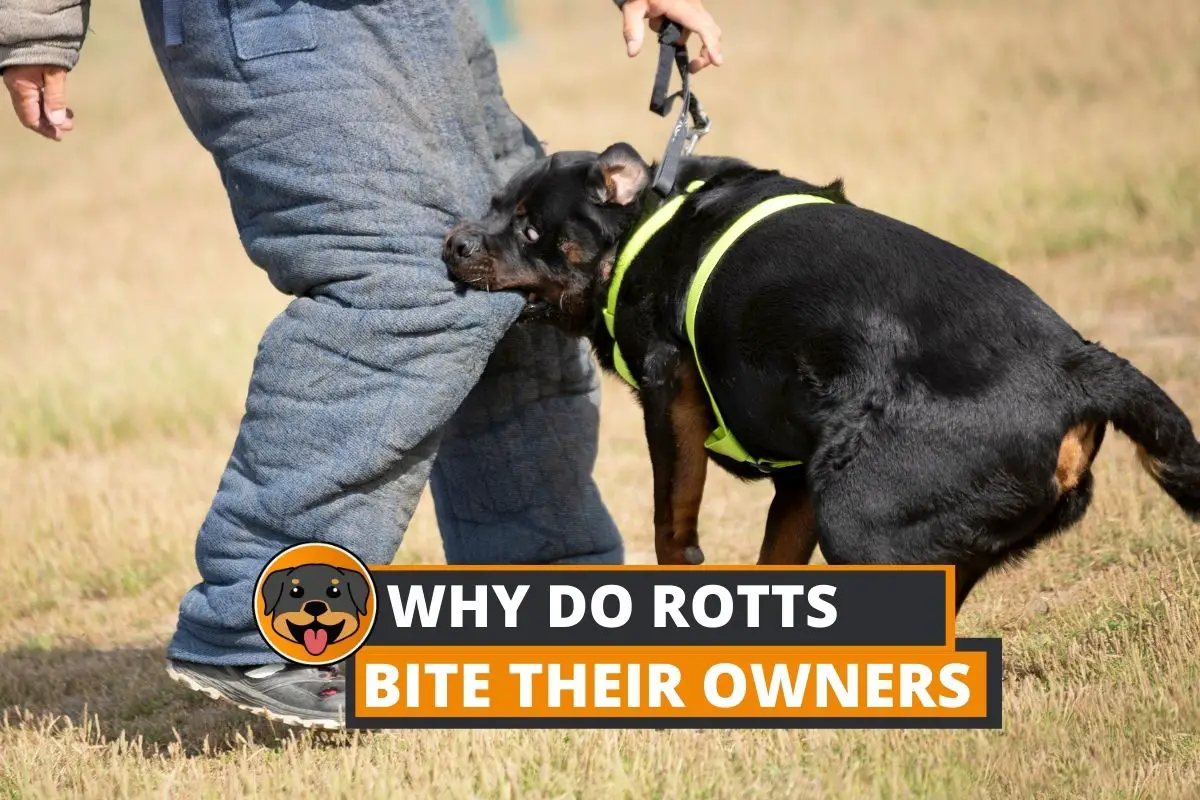Every Rottweiler owner loves investing energy with their canines, so when your dearest companion bites you, it tends to be unsettling. However, it’s critical to realize what precisely is persuading your Rottweiler to behave in this manner, as it can develop into a genuine issue over time.
Reasons Why Rottweilers Bite Their Owners
The following are some of the most common reasons suggested by dog specialists as to why Rottweilers bite their owners:
Establishing Dominance
One of the reasons for your Rottweiler to be biting is the need to establish dominance. Your Rottweiler has a restricted number of ways to express itself, so biting is the only option to express its feelings.
If you’re pushing the dog towards particular types of behavior like getting down from the sofa or learning new tricks, they can snarl or bite to reveal that they aren’t happy with what you’re doing.
Your Rottweiler, undoubtedly, sees itself as the leader of the pack in your home. But, then, when you instruct your dog, it may get confusing as this can conflict with what it sees as the family chain of command. We can generally see this kind of conduct in unneutered male Rottweilers.
Improper Exercise
Without appropriate exercise, Rottweilers tend to get destructive and incredibly energized. However, these are not inactive canines and require lots of exercise to remain calm.
Rottweilers are full of energy, and they need to release this energy regularly. Lack of exercise can lead to a Rottweiler getting angry and lashing out at the owners.
Protection
Your Rottweiler may be attempting to protect something of significant worth. It can be anything, yet it will most likely be consumables, treats, or another individual from your home.
Your Rottweiler may also bite you if they’re guarding something that they value or if they’re protecting their most loved resting place, like their bed or even a food and water bowl.
At times, Rottweilers can even be shielding one member of the family from another.
Fear
Your Rottweiler will move towards biting you on the off chance that they feel undermined or apprehensive for themselves. Canines growl or bite when new people or creatures challenge them.
If you’ve been raising your Rottweiler alone in a calm loft or home, they may not be accustomed to the sorts of the stress new individuals give. Unfortunately, it can eventually lead to your dog biting you out of frustration.
Lack of Attention
Canine behaviorists recommend that many Rottweiler bites happen during the Christmas season. Christmas can aggravate Rottweilers as individuals ask others to remain with their canine while they go out.
A houseful of visitors energized kids around the dog throughout the day, and lack of attention can leave the canine exhausted and baffled. Your Rottweiler can also bite you to show its unhappiness towards the situation.
Pain
Agony can push your Rottweiler to lash out as well. But, for the most part, a charming canine is bound to bite if it’s in torment, like if you urge it to move in a tiny entryway that hurts its joints.
Agony-based biting is quite normal across all breeds of dogs and not just Rottweilers. So if there is a chance that your Rottweiler is hurt and you’re not keeping an eye on its injuries, it can be expected for them to bite.
Once more, your canine has a restricted measure of approaches to express its thoughts and utilize everything it can to make its feelings known.
Illness
Sickness is another regular justification for Rottweiler bites as well. On the off chance that a canine isn’t feeling good, it may not have any desire to be drawn closer or moved by its favorite individuals.
Such conditions can lead the dog to bite the owner or anyone who touches it.
What Can You Do to Avoid This?
As a Rottweiler owner, you should assume liability for preparing your canine and monitoring it consistently. You’re liable for your canine’s conduct and are the primary line of defense against canine bites.
You should do whatever you can to keep others and yourself safe and hold your canine back from biting you or others.
Exercise
Put your Rottweiler through essential preparation in any event, and keep up your canine’s training program for the duration of its life to support the exercises you teach it.
Socialize
Your Rottweiler needs to mingle. So let your dog meet various individuals, including youngsters, incapacitated individuals, and more seasoned individuals under calm, favorable conditions.
Get your dog accustomed to various circumstances like being around other dogs, excess noise, enormous machines, bikes, or whatever else it may fear. Start this preparation with your canine at the youngest age conceivable and keep the encounters positive.
Pay Attention
Focus on your Rottweiler and know when things might be prompting hostility. On the off chance that you can’t handle the circumstance or your canine’s conduct, you may need to hold back and tie up your canine before things turn crazy.
Refrain from Violence
Try not to train your Rottweiler by using physical, fierce, or forceful discipline. Instead, select encouraging feedback—recognition and treats—before falling back on the utilization of aversives.
For example, do not use stun collars and uproarious clamor to get rid of bothersome conduct. Instead, always reward your dog with treats for good behavior, as this is very effective considering Rottweilers love to please their owners.
Regular Checkups
Keep your Rottweiler’s immunizations current, particularly its rabies vaccination, and visit your vet regularly for health exams. A healthy Rottweiler is unlikely to bite its owner or anyone else.
Final Thoughts
Rottweilers are a misunderstood and unnecessarily defamed breed. As a general rule, they are persevering canines who have immense love and fondness for their families.
The dog’s faithfulness, amiability, and perkiness are what make this variety a popular one. If you treat your dog well and pay attention to all its needs, it will never bite you.
With appropriate preparation and care, the Rottweiler can be a family’s dearest companion.





